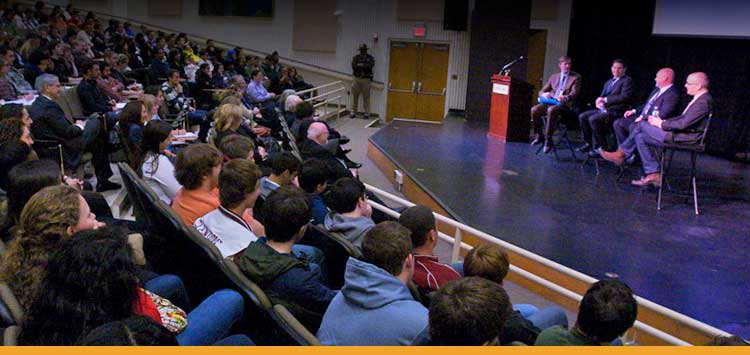PETER S. KALIKOW CENTER FOR THE STUDY OF THE AMERICAN PRESIDENCY
HOFSTRA UNIVERSITY SCHOOL OF LAW
and the
HOFSTRA CULTURAL CENTER
present a symposium
President or King?
Evaluating the Expansion of Executive Power
from Abraham Lincoln to George W. Bush
Wednesday and Thursday
November 4 and 5, 2009
This symposium examines the sources and consequences of the expansion of presidential power in American politics, as well as justifications for and reactions to that expansion. In organizing this event, the Kalikow Center recognizes the bicentennial year of Abraham Lincoln's birthday (February 12, 1809) by examining Lincoln's most enduring legacy for subsequent chief executives, namely, the wide-ranging use of political power in defense of the nation. Lincoln's leadership during the Civil War is widely lauded today, as demonstrated by both scholarly and public opinion polls that rank him as one of the top three "Great" presidents (if not first among the three, which also include George Washington and Franklin D. Roosevelt). His successors, however, have faced more controversy for their wartime leadership, from Lyndon B. Johnson and Richard M. Nixon during the Vietnam War to, more recently, George W. Bush's actions in combating terrorism. The symposium addresses these topics and related issues to understand how presidential power can be exercised to meet constitutional requirements and political expectations in the twenty-first century.
The first panel focuses on presidential leadership in wartime, when the expansion of executive power is most likely to receive popular support. The second panel examines how the other national institutions of government, Congress and the judiciary, have responded to executive assertations of power. The third panel discusses administrative tools that the White House has used to increase its authority and the consequences of those actions in recent years for future presidents. The keynote address for the symposium will be delivered by New York Times columnist David Brooks, and the event will conclude with an assessment of executive leadership in modern American politics by senior experts in the Kalikow Center.
A complete schedule and information about registering can be found in the Symposium Registration Program. Symposium registration is now at the new location -- Lobby, Student Center Theater and you can register on-site.
For more information contact the Hofstra Cultural Center at (516) 463-5669, Monday through Friday, 9 a.m. to 5 p.m.
Symposium Co-Directors:
Meena Bose
Peter S. Kalikow Chair in Presidential Studies
Director, Kalikow Center for the Study of the American Presidency
Professor of Political Science
Hofstra University
Julian G. Ku
Professor of Law and Associate Dean for Faculty Development
Hofstra University School of Law
Eric Lane
Eric J. Schmertz Distinguished Professor of Public Law and Public Service
Hofstra University School of Law
Symposium Coordinator:
Athelene A. Collins
Senior Associate Director
Hofstra Cultural Center
